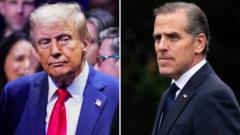In an intriguing twist of fate, Joe Biden and Donald Trump, while often polar opposites politically, resonate in their recent experiences with legal troubles that have captivated the nation. Following the announcement of a "full and unconditional" pardon for his son, Hunter Biden, the president presented a defense marked by themes of injustice and politically motivated prosecutions. He asserted, “No reasonable person would find a fair trial possible for Hunter,” suggesting that the scrutiny was largely a result of his public role as his father’s son.
This sentiment echoes Trump's own arguments. Trump’s conviction regarding campaign finance violations, linked to payments made during the hush-money scandal with Stormy Daniels, was also framed as a politically biased witch hunt. Prominent Republican figures, including Senator Lindsey Graham, voiced similar discontent regarding Trump's prosecution, branding it a "selective prosecution for political purposes."
When comparing the cases of Hunter Biden and Trump, both emerge as politically charged legal scenarios. The legal actions in question surfaced only recently, despite incidents that occurred years before: Trump’s alleged misconduct dates back to 2016, while Hunter’s drug-related gun application and tax issues unfolded from 2016 to 2019. Both cases were seemingly on the brink of dismissal before suddenly being revived, turning the judicial process into a drawn-out spectacle for the public.
Legal experts have noted unusual aspects in how existing laws were applied in both situations, leading to perceptions of bias. Trump’s lawyers have explicitly linked their case to Biden's pardon for Hunter, labeling the judicial processes as unjust and politically influenced. "These comments by President Biden were nothing short of hypocrisy towards his own Department of Justice," they stated.
However, significant disparities exist between the two. Hunter Biden holds no previous public office, while Trump faced multiple serious allegations that stretch beyond the scope of campaign finance. Democrats largely defended the integrity of the Trump trial, viewing the Hunter Biden matters as mere justice served.
Both cases, while distinct, raise critical questions about whether political pressures are skewing judicial outcomes; supporters on both sides have expressed doubts about equitable treatment. Law professor Kevin McMunigal emphasizes the complexity behind prosecutorial decisions, arguing that the public often misunderstands this nuance, creating a perception of injustice particularly regarding elite figures.
The ramifications of Biden's pardon for Hunter might spell political consequences for Trump—not criminal consequences, as the former president continues his path toward a possible return to power. Hunter's pardon shields him from legal repercussions, while Trump, despite facing convictions, seems to navigate the political landscape unscathed thanks to his status.
Looking beyond the individual cases, there is a palpable sense of declining trust in the justice system emanating from these high-profile legal battles. Political scientist John Geer suggests this reflects a broader disillusionment with American political institutions, enduring across a complex web of complex legalities and personal agendas.
Ultimately, Biden’s and Trump’s intertwined fates highlight a larger narrative about the intersection of politics and justice, amplifying a crisis of confidence amongst the electorate regarding the integrity of their systems—one that both politicians appear ready to exploit in their own favor, further complicating the public conversation around accountability and power.


















